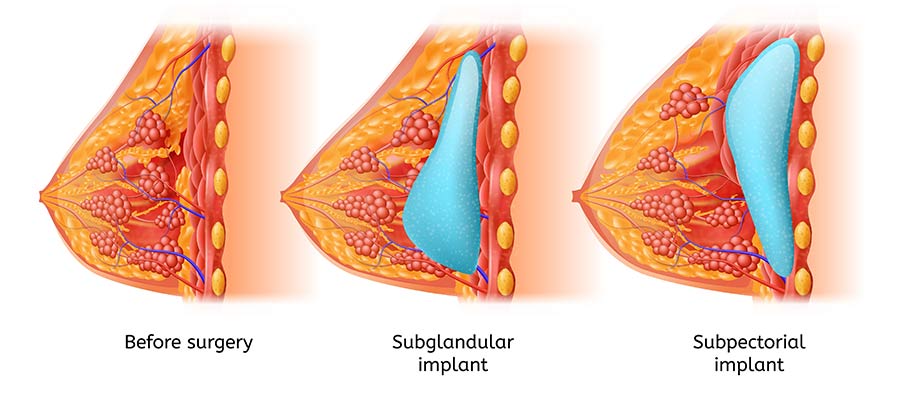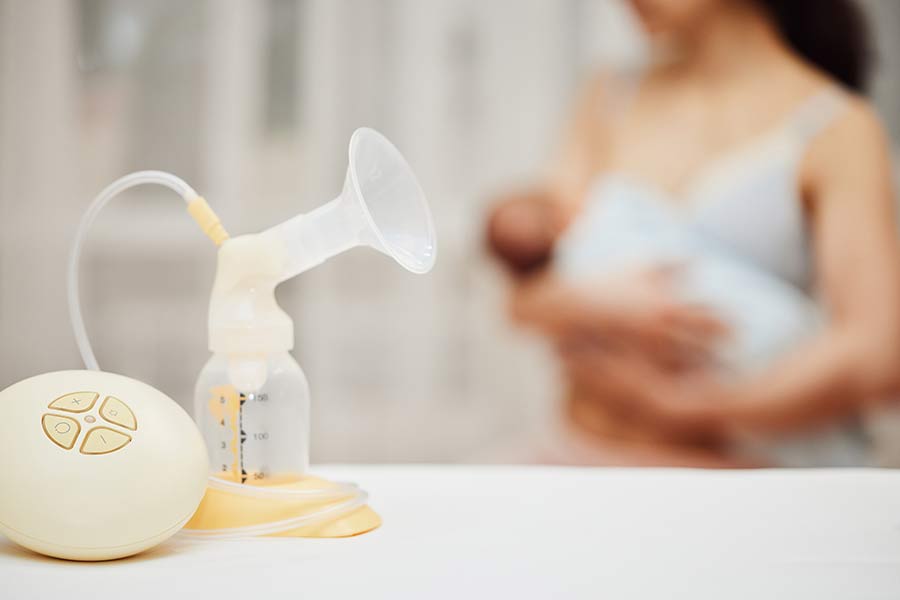Breastfeeding After Previous Breast Surgery: What You Need To Know
Breastfeeding is beautiful way to bond with your baby, and it provides many nutritional and immunological benefits. However, if you have had breast surgery, you may be wondering whether it is still possible to breastfeed. The good news is that, in most cases, breastfeeding after breast surgery is still possible.
Dr Robyn Thompson, experienced midwife and breastfeeding specialist, joined journalist Chelsea Kerley LIVE to discuss breastfeeding after breast surgery. Many viewers wanted to know, if someone has had a previous breast surgery, should they give up on the idea of breastfeeding?
In this Blog, you're going to discover some key things to consider and how you can prepare for your breastfeeding journey. You'll also hear stories from Dr Robyn Thompson's personal experiences working with and alongside Women who have been able to breastfeed after breast surgery.
Dr Robyn Thompson has the unique perspective and experience of working alongside Women, giving birth and breastfeeding, in both the hospital setting and in her private practice birthing at home as well. If you are pregnant, a huge congratulations! We're really glad that you're here and you're looking to learn more.
Here are some things Dr Robyn Thompson said in last week's show:
Can a mother breastfeed after breast or nipple surgery?
A Mother should not give up on the idea of breastfeeding. Not at all, at least in my experience. The Women I've worked alongside have had good success at breastfeeding, even when they've been told previously, they'll never breastfeed or that it's going to be very difficult.
I think that may be where the fear comes, or the fear may be, is that if they've had surgery that has interrupted the ductal networks for example or removed the areola and that's been stitched back, which might have changed the the ductal networks to the nipple.
Every person on the planet is unique. Each Woman's breasts are unique. Her nipples are unique. Her body is unique. We are all genetically and physiologically unique.
Breastfeeding after breast surgery may be a bit more complicated than breastfeeding without any surgery.
Breast implants usually do not impede breastfeeding, but there are a few exceptions. If the incision was made under the breast, then there is a higher chance that the milk ducts may have been cut and that could impact the production of milk. If the nipple was removed and not rebuilt, then it is less likely that the woman will be able to breastfeed.
Types of breast surgery
It is helpful to talk with Women about the type of surgery they have had. That helps us to understand more and to be able to explain things based on a Woman's unique circumstances. We don't need to give up on the idea of breastfeeding, if that is a Mother's wish. Instead, we work with her, educate her, so that she has the best possible opportunity to do what she needs to do.
Photo: Breast augmentation surgery
Is it safe for a mother to breastfeed her infant if she has silicone breast implants?
I'm imagining that this question comes from the history of some implants leaking, so it depends where the implants are. There has been a change in the type of implants used, although I'm not the specialist at this. This was such a big shame for the medical industry. Hopefully, many women that did go through that have had that issue resolved now.
There is no reason, unless your surgeon tells you otherwise, to be concerned about the actual safety of breastfeeding a young baby or any baby, for that matter. I encourage women to discuss this with their medical professional if there are any specific questions about their implants and breastfeeding.
If it is a woman's desire to breastfeed, and she is concerned about a previous breast surgery, I reassure her that there are many women in our community who are successfully breastfeeding with similar circumstances.
Breastfeeding with Implants
If the implants are placed behind the pectoral muscle, then the forward part of the glandular tissue is generally in the breast and ductal networks, the ductal networks down to the nipple ducts haven't been interfered with. And quite often, that's very successful and shouldn't interfere with breastfeeding.
I think sometimes women are told before they've even tried, that if a certain part of the breast is touched during surgery, they won't be able to breastfeed. I have seen some women who had their areola removed and replaced, and they have been able to breastfeed successfully.
One of the things to consider when breastfeeding after breast surgery is the type of surgery that was performed. Breast procedures can be divided into two categories: those that remove all or part of the breast tissue, and those that preserve the breast tissue. If all or part of the breast tissue was removed, it's still possible to breastfeed, but the milk production may be reduced.

If the surgery preserved the breast tissue, breastfeeding should be possible without any significant changes.
Understanding and implementing those 3 Golden Hours™ is really key, even for women who haven't had breast surgery, because that gives you the best possible start to breastfeeding.
Learn more about the first breastfeed and The Thompson Method 3 Golden Hours™ here.
Does previous breast surgery cause low milk supply?
It's individual for each woman. It depends on the extent of the surgery and whether flow has been interrupted through the glandular tissue or whether there has been any damage to the ductal networks. If the surgery was for implants, the implants are often placed behind the glandular tissue, but can also take up space in the breasts where the glandular tissue would normally fill out.
Breast milk production is hormonal. If the baby is able to stimulate the breasts well with a rhythmical draw - swallow, following the key principles of The Thompson Method™, there is every chance a woman will be able to breastfeed. But it really depends on her unique circumstances and the events that occur around her labour and birth.
Breast surgery, including reduction, augmentation, and lift surgeries, may cause low milk volume. This happens because the surgery removes some of the glandular that assist in breast milk production. Breastfeeding can still be successful after breast surgery, but it may take some extra time, patience and guidance from a breastfeeding professional.
Many new mothers worry about whether they are producing enough milk for their baby. While low supply is often the result of misinformation or unrealistic expectations, it can be a challenge for some Mothers.
Breast milk production
Understanding how breast milk production works, how your body works to create milk, is key to being able to make informed decisions.
Many women who have expressed their concerns, worry that they have not got enough milk for their precious babies. Sometimes, sadly a lot of the time, it's because they've been suggested it by someone else. Maybe they've even had an interruption in that milk production process in the first 72 - 96 hours. They may have had opioids administered during labour. Perhaps they've been encouraged to do formula top ups, or they've been told to express in those early days to increase milk volume, and this in turn has created some other breastfeeding complications.
The pituitary gland is responsible for hormone production, which creates breast milk. The breast tissue and is made up of a network of milk ducts, alveoli, and fat cells. A woman's body will begin to produce colostrum during the lates stages of pregnancy in preparation for the birth of her baby. After a Woman gives birth to her precious baby, milk production will continue in response to hormone stimulation. Breastfeeding helps to stimulate the release of the milk producing hormones - Prolactin and Oxytocin, which helps to establish and maintain breast milk production.
I have the privilege of being with and beside women, one on one. Myself and my team of Thompson Method Practitioners focus on the individual Woman and her unique needs and circumstances. This allows for us to observe and become more informed about that unique woman, her body, her baby. It is really important.
Knowledge is power. And having the understanding to make informed decisions is the key to a successful breastfeeding journey. Our wonderful community, who are guided and supported by our team of Women in the Breastfeeding Club, have access to a wealth of information to support their unique situations and to be fully prepared for their birth and breastfeeding journey before their baby arrives.
Is it possible to breastfeed following a mastectomy?
Breastfeeding after a mastectomy is possible and can be successful for many women. There are a few things to consider when starting breastfeeding after a mastectomy, such as the type of surgery you had, whether or not you have nipple reconstruction, and your overall comfort level.
It is important to consult with your surgeon prior to beginning breastfeeding to ensure that it is safe for you to do so. For some Women, it may take a little longer to learn how to breastfeed effectively after a mastectomy. However, with patience and gentle guidance, many women have been able to successfully breastfeed their baby after a mastectomy.

I have worked with women who've had mastectomy, who wanted to have their babies on their body but were unable to breastfeed. So we set up a feeding line for them, or one that was beside them rather than around their neck. They were able to offer, short sessions of feeding that way, just as the sensation of their baby being with them.
The use of a breastfeeding supplement nursing system (SNS) can be beneficial in some circumstances. This system allows mothers to supplement their own milk with expressed breast milk or formula, while still providing the baby with the nutrients and antibodies found in breast milk.
We recently heard a very positive story about a woman who had mastectomy removal of one breast, and she was able to breastfeed for three years, on a singular breast. And we were very proud of her. So that was very lovely to hear that with the right preparation and support she was able to do that.
I am continually encouraged by those women and I learn so much from them as well. I'm forever grateful and very privileged to have worked with as many women as I have over the years who have magic stories to tell, in their own unique way.
Is it possible to breastfeed with one breast?
According to the National Cancer Institute, about 1 in 8 women in the United States will develop breast cancer at some point in their lives. For some women, this means undergoing a mastectomy, or the removal of one or both breasts. While this can be a difficult decision, it is important to know that it does not have to mean the end of breastfeeding.
Women who have had a mastectomy can still breastfeed with one breast. There are also a number of companies that make special bras for women who have had mastectomies, which can make breastfeeding easier and more comfortable.
Main points to take away from the LIVE show
- Whether or not you have undergone breast surgery, preparation for breastfeeding DURING PREGNANCY, can make all the difference in your breastfeeding journey
- Breast surgery 'may' influence breastfeeding, but it really does depend on whether there was any damage to the glandular tissue
- Understanding and implementing the Thompson Method 3 Golden Hours will give you the best start to establishing breastfeeding and breast milk production
- Speaking with your breast surgeon can help you understand the type of breast surgery you have had and HOW it may (if at all) impact breastfeeding
I think that the few points to elaborate from the LIVE show is that every body woman and baby and breasts is so completely unique, it's hard to answer whether it's going to be possible for you to breastfeed or not.
Please take reassurance in knowing that there are many women in our community that are successfully breastfeeding, following breast surgery and implants, or augmentation, many, different surgeries.
So reach out and connect with us. We'll hopefully chat and discuss this a bit further. But like Dr Robyn said, give yourself the best possible possible chance of breastfeeding, by giving it a try. Don't feel coerced, or have any fear put on you before you've given yourself the best possible chance.
--------
Learn more how you can be fully prepared and confident about your birth and breastfeeding journey with The Thompson Method...
► Join Our Free Facebook Group
► The Thompson Method Breastfeeding Course
► Download The Thompson Method Tips on Breastfeeding
FOLLOW The Thompson Method Breastfeeding on Social Media
► Join Our Free Facebook Group
► Follow Dr Robyn Facebook
► Follow us Instagram
► Watch us on YouTube
► Follow us Pinterest
► Follow Dr Robyn on LinkedIn






